Taxation Law: Calculating Andrew Smith's Assessable Income for 2019
VerifiedAdded on 2023/04/11
|6
|620
|293
Report
AI Summary
This report provides a detailed calculation of Andrew Smith's assessable income for the year ending June 30, 2019, based on his sole legal practice. It addresses the tax implications of cash received from clients for legal services, accounts receivable, and the recovery of a bad debt. The analysis applies relevant sections of the ITAA 1997, specifically Section 6-5 regarding ordinary income and subsection 63(3) concerning the recovery of bad debts. The report uses the 'cite, describe, apply' approach, referencing case law such as FCT v Dixon (1952) to support the determination of income from services rendered. The recovered bad debt of $5,000 is also assessed as taxable income under legislative provisions, contributing to the final calculation of Andrew's assessable income for the specified year.
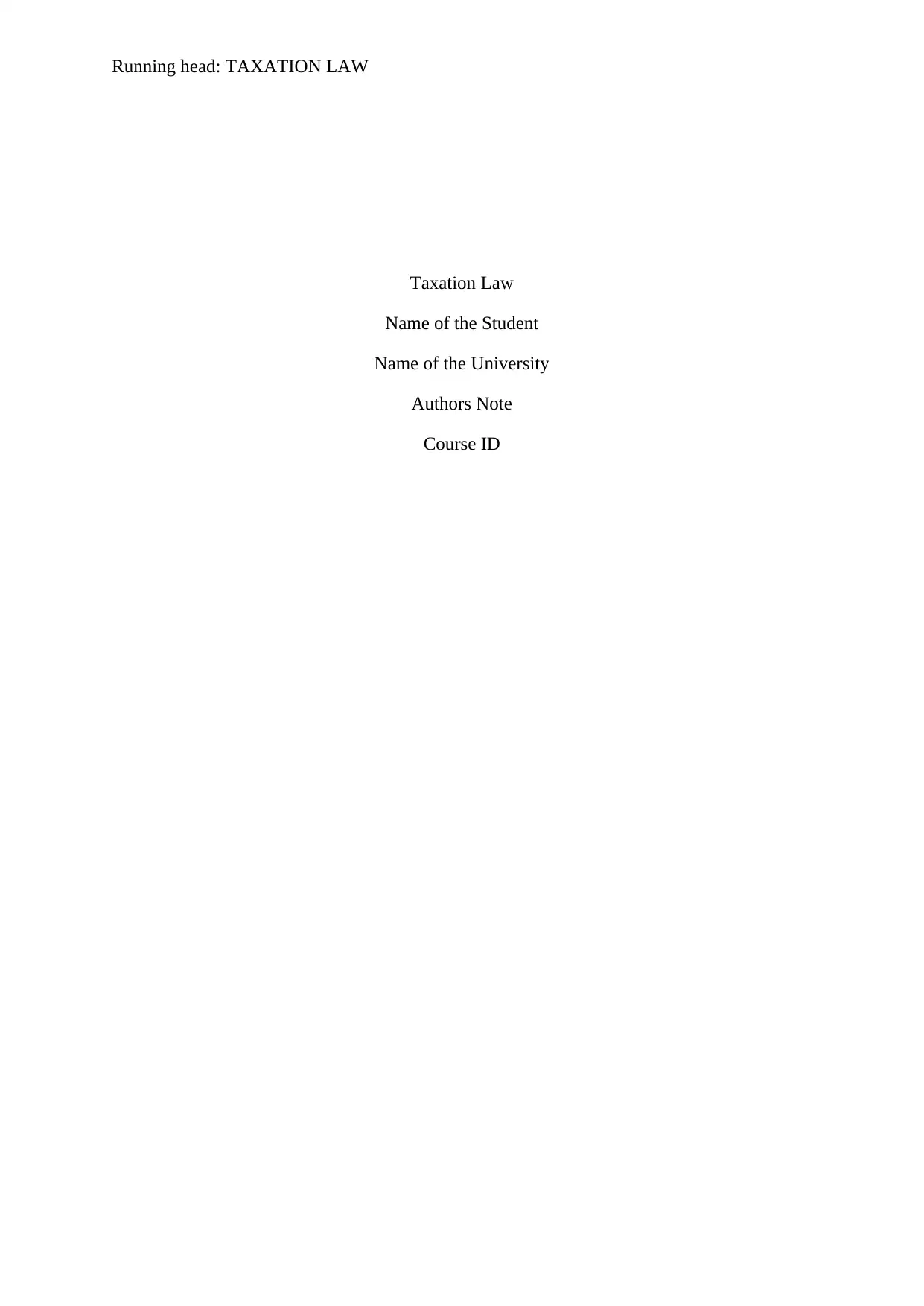
Running head: TAXATION LAW
Taxation Law
Name of the Student
Name of the University
Authors Note
Course ID
Taxation Law
Name of the Student
Name of the University
Authors Note
Course ID
Paraphrase This Document
Need a fresh take? Get an instant paraphrase of this document with our AI Paraphraser
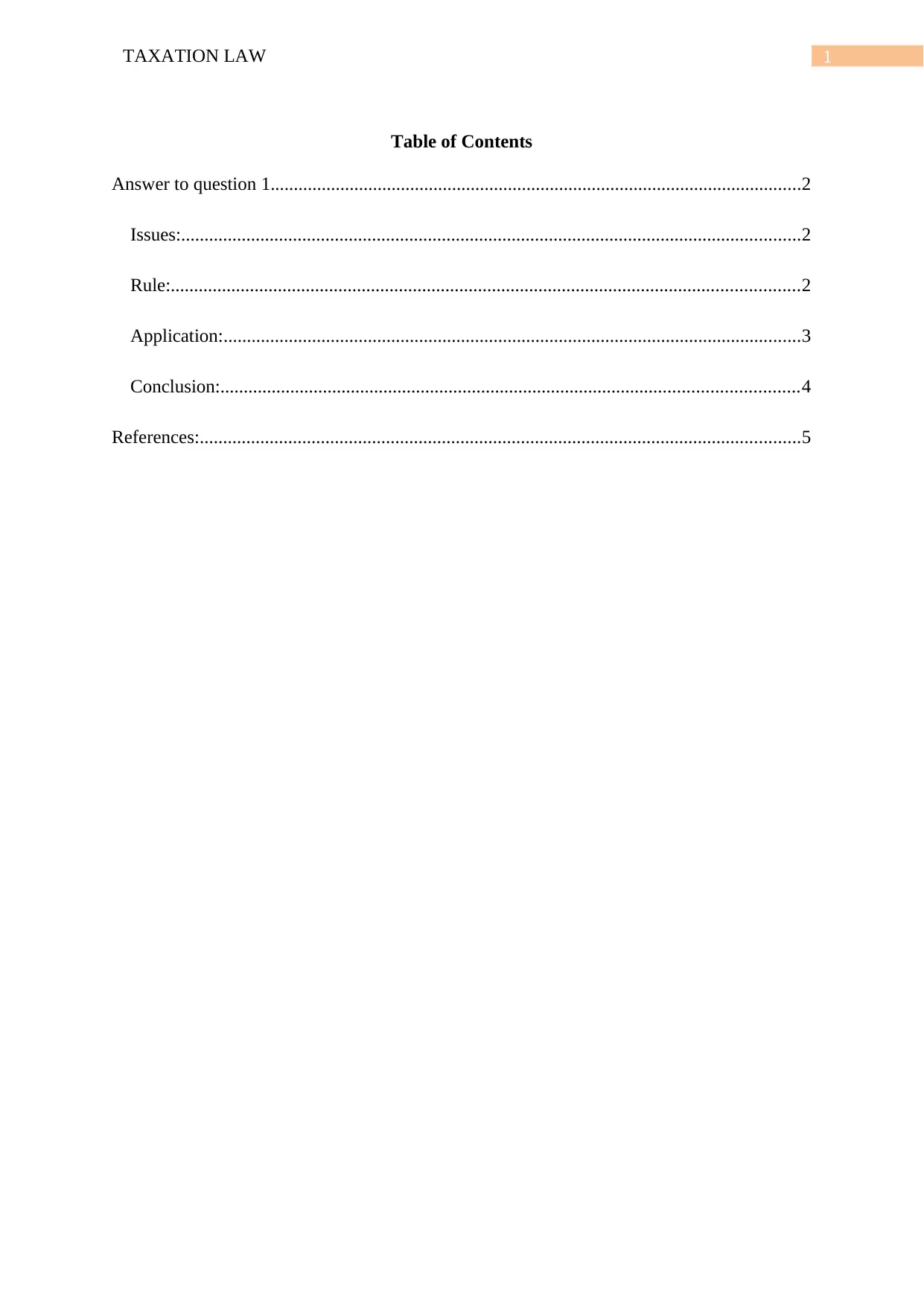
1TAXATION LAW
Table of Contents
Answer to question 1..................................................................................................................2
Issues:.....................................................................................................................................2
Rule:.......................................................................................................................................2
Application:............................................................................................................................3
Conclusion:............................................................................................................................4
References:.................................................................................................................................5
Table of Contents
Answer to question 1..................................................................................................................2
Issues:.....................................................................................................................................2
Rule:.......................................................................................................................................2
Application:............................................................................................................................3
Conclusion:............................................................................................................................4
References:.................................................................................................................................5
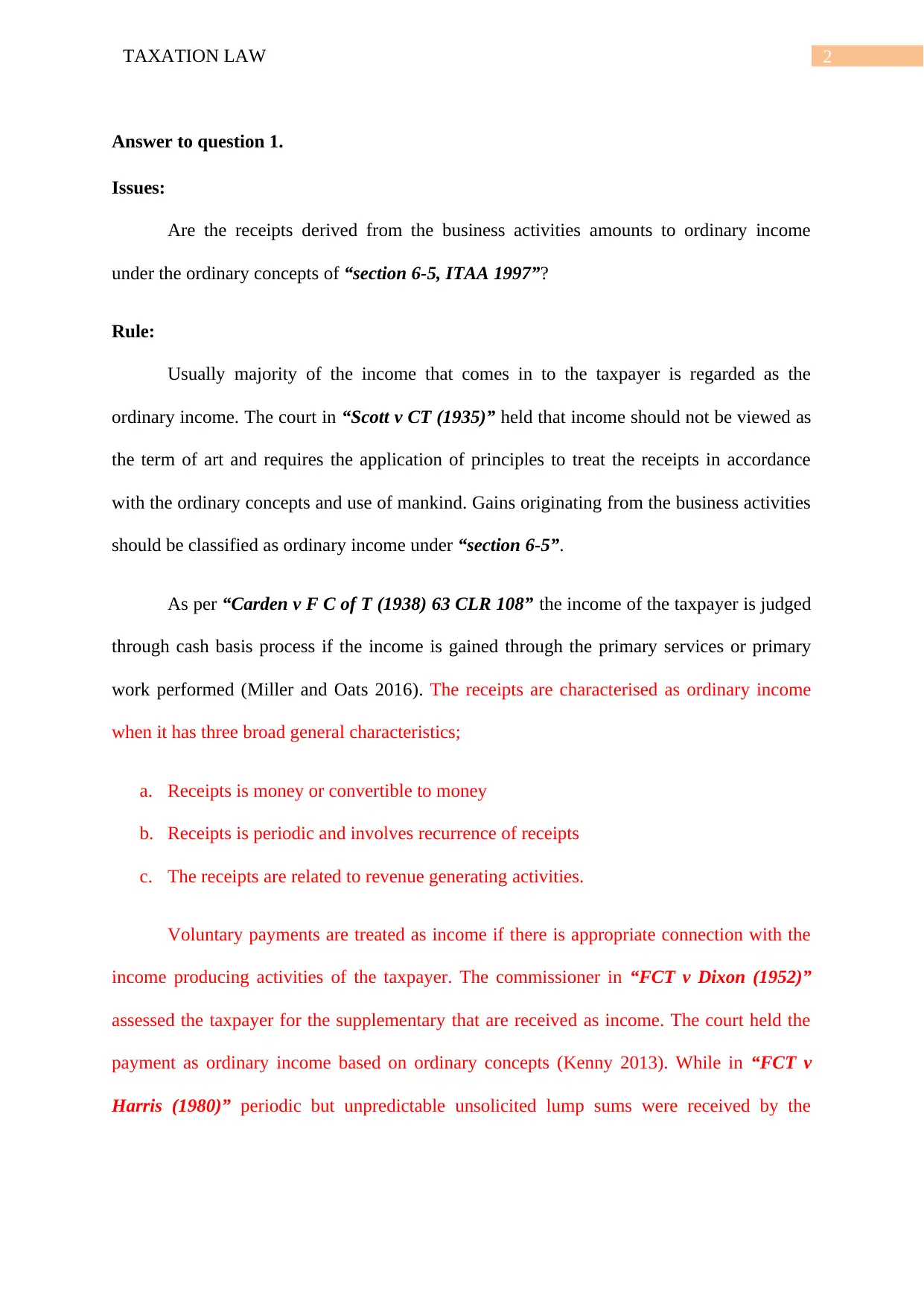
2TAXATION LAW
Answer to question 1.
Issues:
Are the receipts derived from the business activities amounts to ordinary income
under the ordinary concepts of “section 6-5, ITAA 1997”?
Rule:
Usually majority of the income that comes in to the taxpayer is regarded as the
ordinary income. The court in “Scott v CT (1935)” held that income should not be viewed as
the term of art and requires the application of principles to treat the receipts in accordance
with the ordinary concepts and use of mankind. Gains originating from the business activities
should be classified as ordinary income under “section 6-5”.
As per “Carden v F C of T (1938) 63 CLR 108” the income of the taxpayer is judged
through cash basis process if the income is gained through the primary services or primary
work performed (Miller and Oats 2016). The receipts are characterised as ordinary income
when it has three broad general characteristics;
a. Receipts is money or convertible to money
b. Receipts is periodic and involves recurrence of receipts
c. The receipts are related to revenue generating activities.
Voluntary payments are treated as income if there is appropriate connection with the
income producing activities of the taxpayer. The commissioner in “FCT v Dixon (1952)”
assessed the taxpayer for the supplementary that are received as income. The court held the
payment as ordinary income based on ordinary concepts (Kenny 2013). While in “FCT v
Harris (1980)” periodic but unpredictable unsolicited lump sums were received by the
Answer to question 1.
Issues:
Are the receipts derived from the business activities amounts to ordinary income
under the ordinary concepts of “section 6-5, ITAA 1997”?
Rule:
Usually majority of the income that comes in to the taxpayer is regarded as the
ordinary income. The court in “Scott v CT (1935)” held that income should not be viewed as
the term of art and requires the application of principles to treat the receipts in accordance
with the ordinary concepts and use of mankind. Gains originating from the business activities
should be classified as ordinary income under “section 6-5”.
As per “Carden v F C of T (1938) 63 CLR 108” the income of the taxpayer is judged
through cash basis process if the income is gained through the primary services or primary
work performed (Miller and Oats 2016). The receipts are characterised as ordinary income
when it has three broad general characteristics;
a. Receipts is money or convertible to money
b. Receipts is periodic and involves recurrence of receipts
c. The receipts are related to revenue generating activities.
Voluntary payments are treated as income if there is appropriate connection with the
income producing activities of the taxpayer. The commissioner in “FCT v Dixon (1952)”
assessed the taxpayer for the supplementary that are received as income. The court held the
payment as ordinary income based on ordinary concepts (Kenny 2013). While in “FCT v
Harris (1980)” periodic but unpredictable unsolicited lump sums were received by the
⊘ This is a preview!⊘
Do you want full access?
Subscribe today to unlock all pages.

Trusted by 1+ million students worldwide
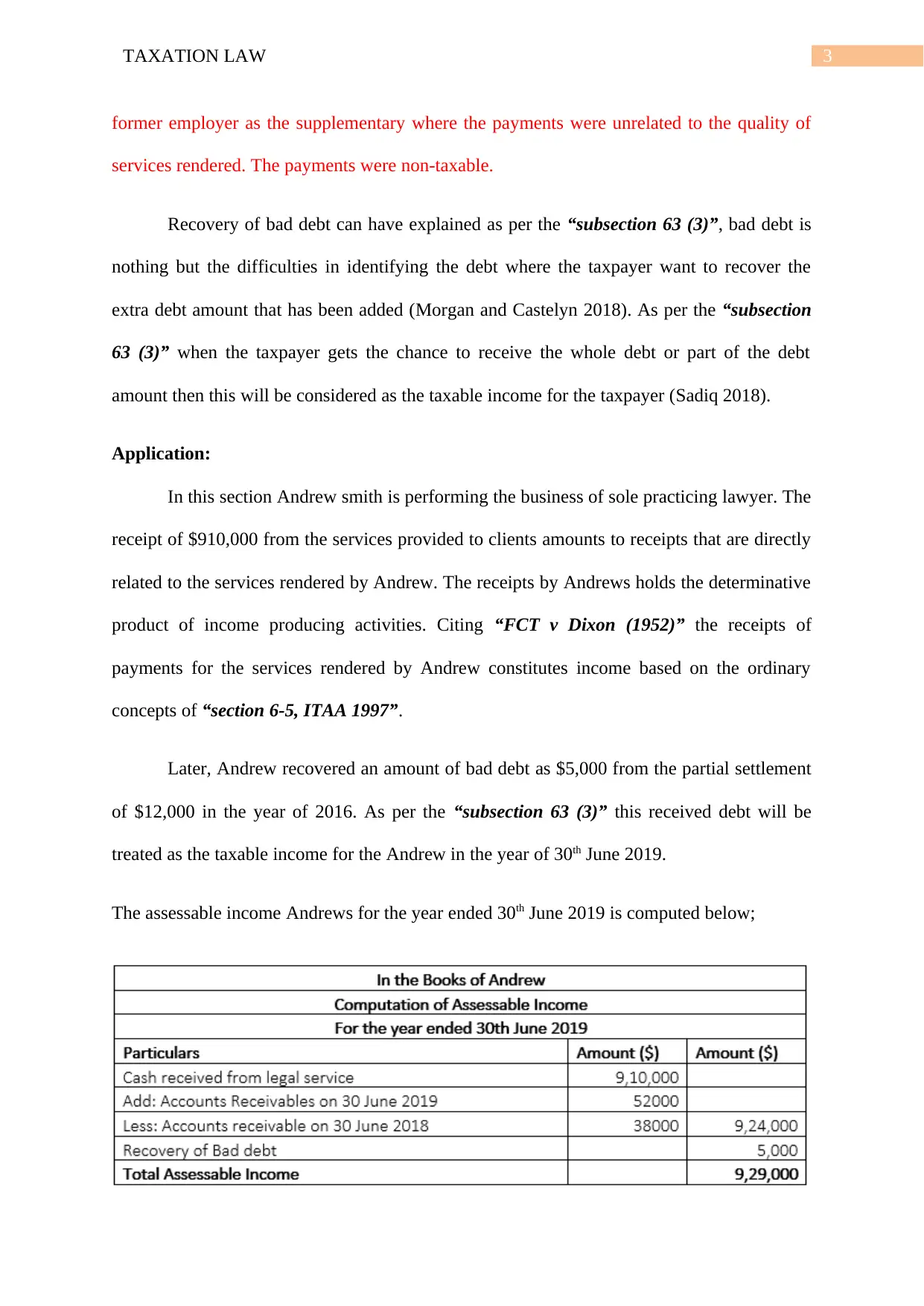
3TAXATION LAW
former employer as the supplementary where the payments were unrelated to the quality of
services rendered. The payments were non-taxable.
Recovery of bad debt can have explained as per the “subsection 63 (3)”, bad debt is
nothing but the difficulties in identifying the debt where the taxpayer want to recover the
extra debt amount that has been added (Morgan and Castelyn 2018). As per the “subsection
63 (3)” when the taxpayer gets the chance to receive the whole debt or part of the debt
amount then this will be considered as the taxable income for the taxpayer (Sadiq 2018).
Application:
In this section Andrew smith is performing the business of sole practicing lawyer. The
receipt of $910,000 from the services provided to clients amounts to receipts that are directly
related to the services rendered by Andrew. The receipts by Andrews holds the determinative
product of income producing activities. Citing “FCT v Dixon (1952)” the receipts of
payments for the services rendered by Andrew constitutes income based on the ordinary
concepts of “section 6-5, ITAA 1997”.
Later, Andrew recovered an amount of bad debt as $5,000 from the partial settlement
of $12,000 in the year of 2016. As per the “subsection 63 (3)” this received debt will be
treated as the taxable income for the Andrew in the year of 30th June 2019.
The assessable income Andrews for the year ended 30th June 2019 is computed below;
former employer as the supplementary where the payments were unrelated to the quality of
services rendered. The payments were non-taxable.
Recovery of bad debt can have explained as per the “subsection 63 (3)”, bad debt is
nothing but the difficulties in identifying the debt where the taxpayer want to recover the
extra debt amount that has been added (Morgan and Castelyn 2018). As per the “subsection
63 (3)” when the taxpayer gets the chance to receive the whole debt or part of the debt
amount then this will be considered as the taxable income for the taxpayer (Sadiq 2018).
Application:
In this section Andrew smith is performing the business of sole practicing lawyer. The
receipt of $910,000 from the services provided to clients amounts to receipts that are directly
related to the services rendered by Andrew. The receipts by Andrews holds the determinative
product of income producing activities. Citing “FCT v Dixon (1952)” the receipts of
payments for the services rendered by Andrew constitutes income based on the ordinary
concepts of “section 6-5, ITAA 1997”.
Later, Andrew recovered an amount of bad debt as $5,000 from the partial settlement
of $12,000 in the year of 2016. As per the “subsection 63 (3)” this received debt will be
treated as the taxable income for the Andrew in the year of 30th June 2019.
The assessable income Andrews for the year ended 30th June 2019 is computed below;
Paraphrase This Document
Need a fresh take? Get an instant paraphrase of this document with our AI Paraphraser
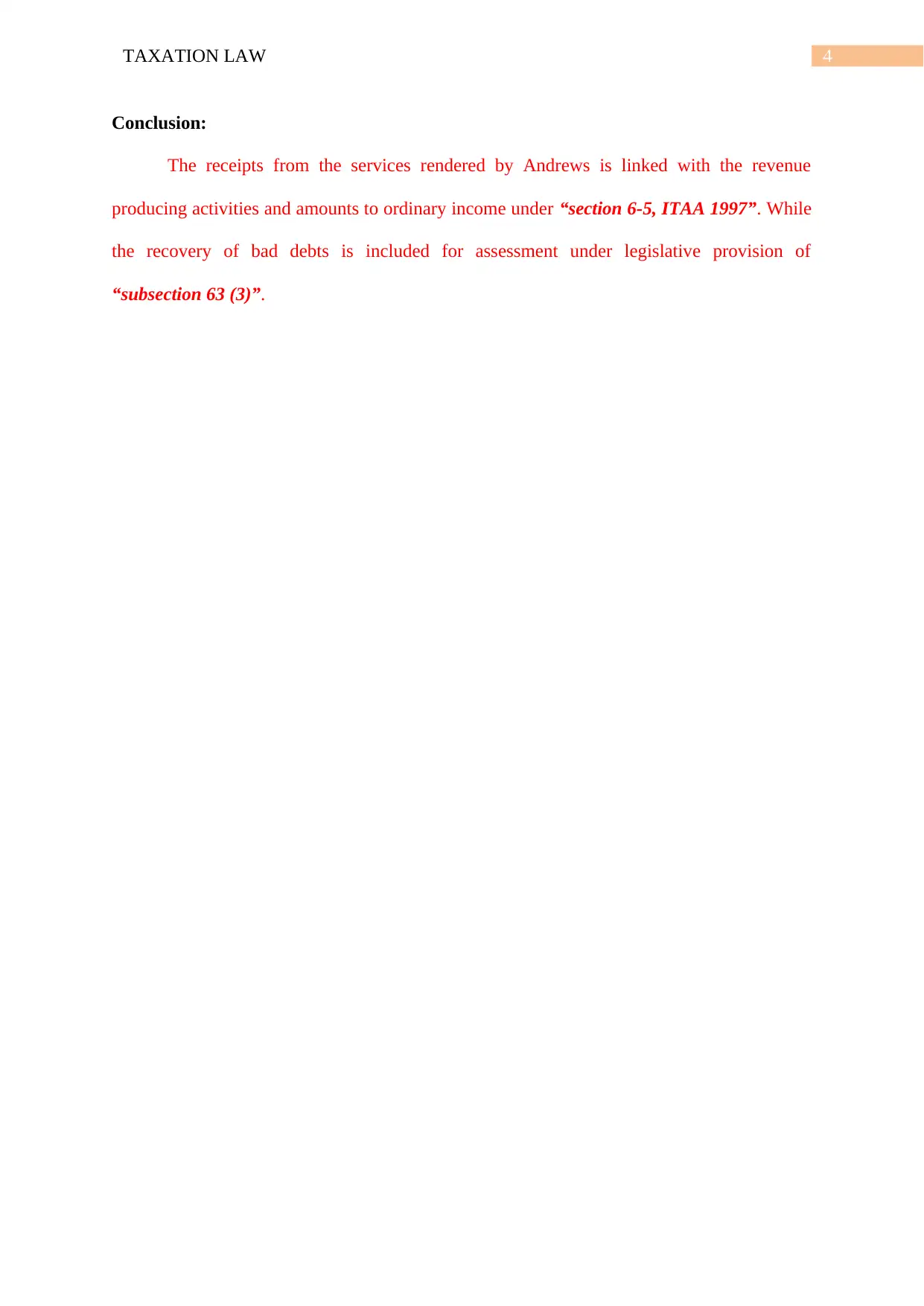
4TAXATION LAW
Conclusion:
The receipts from the services rendered by Andrews is linked with the revenue
producing activities and amounts to ordinary income under “section 6-5, ITAA 1997”. While
the recovery of bad debts is included for assessment under legislative provision of
“subsection 63 (3)”.
Conclusion:
The receipts from the services rendered by Andrews is linked with the revenue
producing activities and amounts to ordinary income under “section 6-5, ITAA 1997”. While
the recovery of bad debts is included for assessment under legislative provision of
“subsection 63 (3)”.
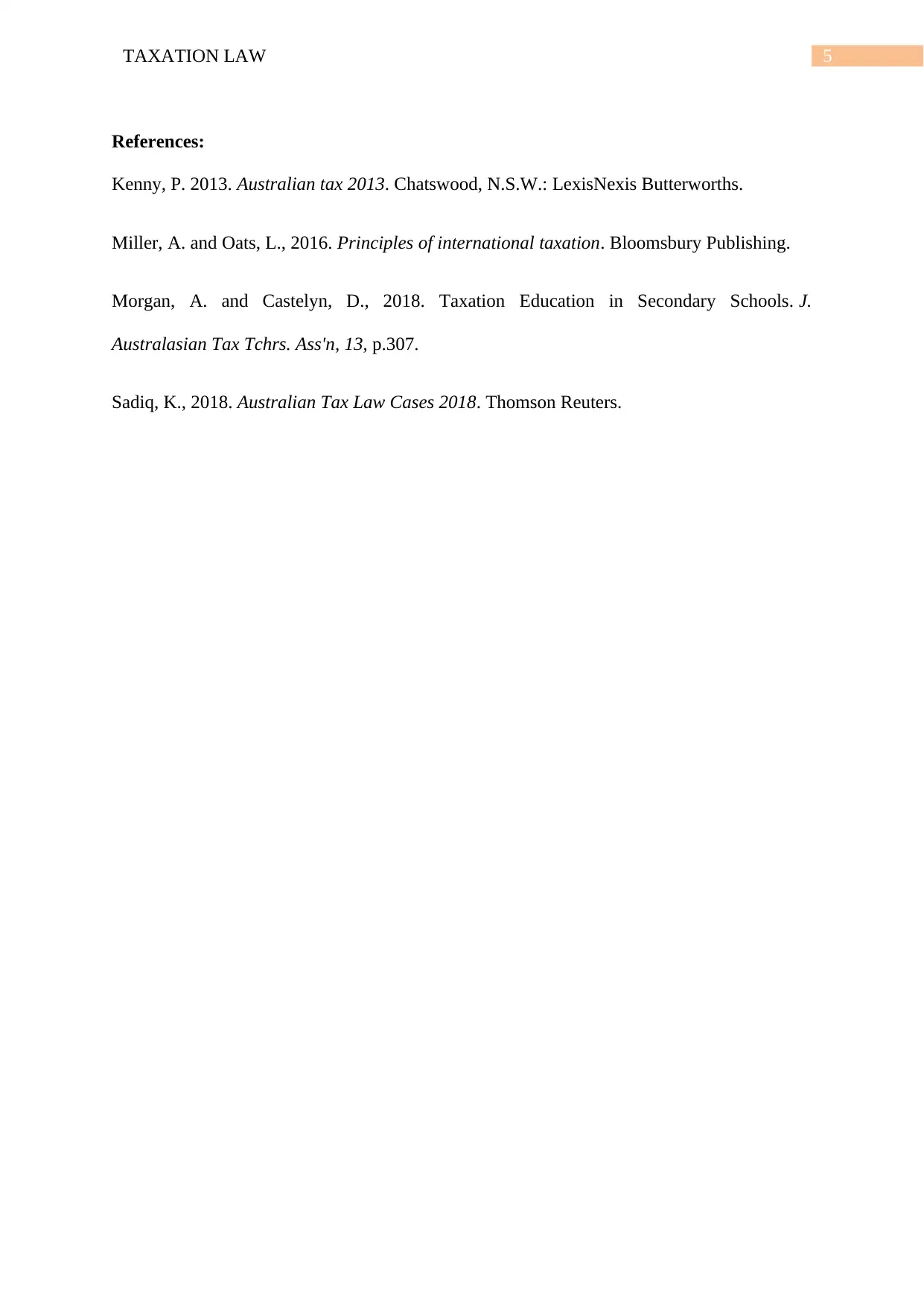
5TAXATION LAW
References:
Kenny, P. 2013. Australian tax 2013. Chatswood, N.S.W.: LexisNexis Butterworths.
Miller, A. and Oats, L., 2016. Principles of international taxation. Bloomsbury Publishing.
Morgan, A. and Castelyn, D., 2018. Taxation Education in Secondary Schools. J.
Australasian Tax Tchrs. Ass'n, 13, p.307.
Sadiq, K., 2018. Australian Tax Law Cases 2018. Thomson Reuters.
References:
Kenny, P. 2013. Australian tax 2013. Chatswood, N.S.W.: LexisNexis Butterworths.
Miller, A. and Oats, L., 2016. Principles of international taxation. Bloomsbury Publishing.
Morgan, A. and Castelyn, D., 2018. Taxation Education in Secondary Schools. J.
Australasian Tax Tchrs. Ass'n, 13, p.307.
Sadiq, K., 2018. Australian Tax Law Cases 2018. Thomson Reuters.
⊘ This is a preview!⊘
Do you want full access?
Subscribe today to unlock all pages.

Trusted by 1+ million students worldwide
1 out of 6
Related Documents
Your All-in-One AI-Powered Toolkit for Academic Success.
+13062052269
info@desklib.com
Available 24*7 on WhatsApp / Email
![[object Object]](/_next/static/media/star-bottom.7253800d.svg)
Unlock your academic potential
Copyright © 2020–2026 A2Z Services. All Rights Reserved. Developed and managed by ZUCOL.





